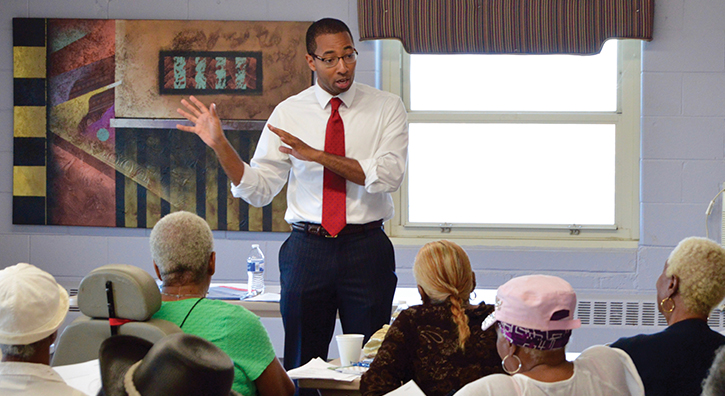
(Photo courtesy Christian Mitchell)
Feeling inspired to try to change the world? Illinois state representative Christian Mitchell, AB’08, has some advice.
Christian Mitchell grew up in Chicago’s western suburbs of Maywood and Westchester. He came to UChicago intending to major in economics, get a JD/MBA, and become a sports attorney.
Instead, a conversation with his resident head at Alper House during his first year convinced him to major in public policy studies and get involved in Democratic politics. Now he represents Illinois’s 26th District, which stretches from South Chicago to Streeterville and the Near North Side.
Ask yourself why.
“Don’t run just to run. Run because you see something that needs to be different,” Mitchell says. “If you’ve got a fantastic state elected official or fantastic alderman, why are you going to run against them?”
Ask yourself why again.
Anybody can say they want to help people or make a difference. “What is the thing that keeps you up at night? What is your story?”
Work on somebody else’s campaign, preferably a local one.
You’ll learn a lot about campaigning and possibly make a future ally.
Check your expectations—and your ego.
“There’s a common saying in Chicago: ‘We don’t want nobody who nobody sent.’* That’s not actually true. ‘We don’t want nobody who nobody sent who thinks they’re somebody’ would be more accurate,” he says. “You have to be willing to do any dirty little job on the campaign—stuffing envelopes, refilling the bottles to wet the back of the envelopes, getting coffee.”
Talk to people who have done it before.
“See if you can get folks to support you. For example, if the state rep is retiring, will that rep support you?”
Raise money.
You can and should hit up friends, relatives, and coworkers, but you’ll also need institutional support. “Are you running as a Republican? What work have you done with the local business community or the manufacturing association or other local business interests? If you’re a Democrat, who do you know in the environmental community? Who do you know who is interested in campaign finance reform? Do you have relationships with labor unions, if that’s the sort of Democrat that you are?”
Commission a poll.
“If those numbers come back and say it’s an uphill climb,” Mitchell says, “you’ve got to decide, ‘Do I want to make this run to get my name out there? Or do I want to wait for a chance that I can win?’”
Get your signatures.
All candidates must file a nominating petition with legal, verifiable signatures of voters who live in their district. The number of signatures needed varies by office and state. Mitchell needed a minimum of 500.
Hire staff.
Mitchell recommends starting with a campaign manager, who will hire everyone else.
Understand that even if you’ve run campaigns, it’s not the same when you’re the candidate.
“It is different when your name is on the door. That is your name, that is your brand, that is your family. That is yourself. That is everything. It is a deeply humbling experience. And it is a siege. It is a pride-swallowing siege.”
Wait.
“The candidate is the most useless human being in the entire campaign on Election Day.”
* According to legend, a ward committeeman said this to a young Abner Mikva, JD’51, when he tried to sign up as a campaign volunteer. Mikva went on to serve in the Illinois House and the US Congress and became a federal judge and White House adviser.
